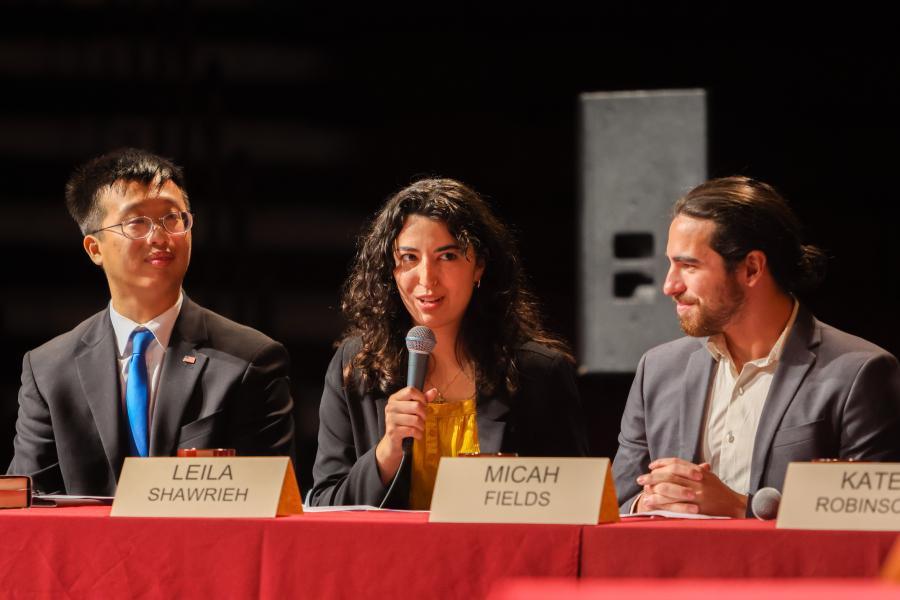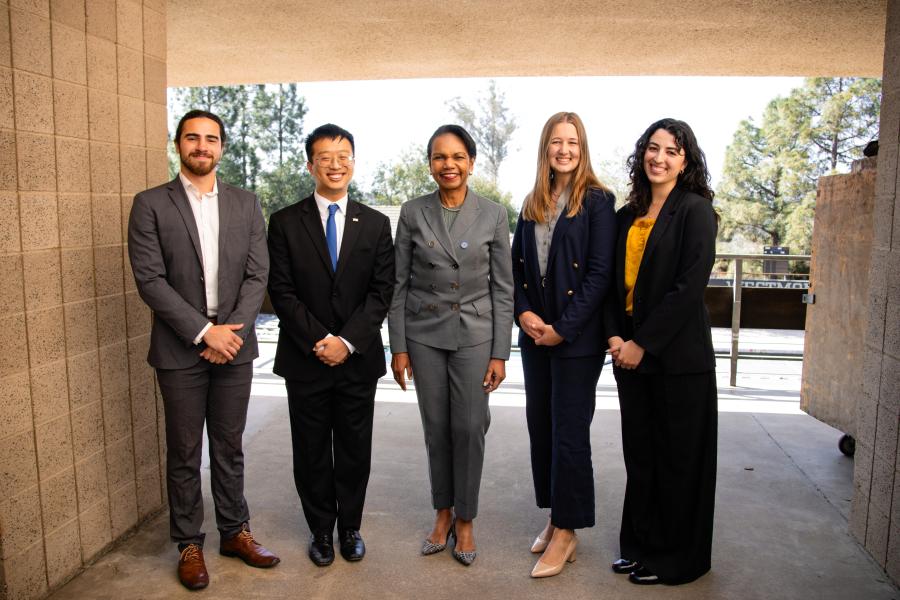NEWS
Condoleezza Rice Discusses Democracy
Condoleezza Rice, the 66th U.S. secretary of state, and other international hot spots, while sprinkling wisdom about democracy, education and her childhood in segregated Birmingham, Alabama, at the Westmont President’s Breakfast on February 28. More than 700 early-morning attendees enjoyed the sold out event, now in its 20th year at the Hilton Santa Barbara Beachfront Resort.
President Gayle D. Beebe gave the Westmont Leadership Award to Rice before engaging her in an hour-long conversation on stage. Opening on the Russia-Ukraine war, Rice said with 200,000 Russian soldiers dead and 600,000 injured, it’s time for the conflict to end. “The Russian army went into this war with five days’ provisions and their dress uniforms for the parade into Kyiv,” she said. “And here we are, three years later, and everybody’s still slugging it out. Ukraine needs to — as a secure, independent, sovereign country — get back to rebuilding itself, rebuilding its democracy, because it’s losing people.”

Rice noted that with so much devastation, no one wins. But the Ukrainians will gain if they can keep their sovereignty, independence and security and be- come prosperous again. While Russia may continue holding captured territory, Putin can’t feel victorious and should never attack Ukraine again. She says that will require security guarantees, likely from Europe.
In her book “Democracy: Stories from the Long Road to Freedom” (2017), Rice examines the institution of democracy and several countries that have faced many of the same stressors present today. “Democracy’s genius is its openness to change, but its stability comes through institutions that embody constraint,” she writes.
At the breakfast, she said the Founding Fathers, especially James Madison, thought individual freedoms were important but had to be exercised through institutions or mob rule results. The Constitution established distributed power to prevent tyranny in states and localities.
Rice emphasized the extraordinary ability of the U.S. Constitution to sustain change for nearly 250 years. “Americans think the Constitution is their personal protector,” Rice said. “My friend said, ‘You Americans, you think just because you have rights you have to exercise them.’ That would be us.”
She last served in the government in January 2009, and she has reflected on her foreign policy successes as well as the countries that continue to pose a challenge to the U.S., including Afghanistan. She said the U.S. lacked patience there.
“I wonder why we become so impatient with others as they’re trying to make this democratic transition,” she said. “It’s a really hard to say to human beings, ‘Put aside tribe, put aside family.’ It takes time for people to trust that these abstractions called institutions will look out for their interests. I think the Afghan people are paying a terrible price — especially Afghan women. All they wanted to do was to educate their girls. You can’t just wipe out a government and start over because history will continually undermine what you do.”
Rice shared that her great-grandmother learned to read because she was a slave master’s daughter and said that oppressors always go after education. “You keep people from reading, then you can keep them from pursuing their own horizons,” she said. “You deny them that ability to really exercise freedom in a way. That’s what the Taliban did.”
She expressed concern about the United States, noting that democracy depends on an educated citizenry. If children can’t read by the third grade, they’ll likely never read, she said. “There are too many poor kids stuck in bad schools who can’t read. It’s a national disgrace.”
Rice warned about China’s technological progress, stating that the United States needs to sustain technological superiority. “Americans will need to work harder and work faster to win in transformational technology,” she said.
While recognizing the benefits of globalization, Rice cautioned that we have to stop ignoring those who were left out when we lost our manufacturing base. “The good news is that they’re finding their voice in institutions, not outside them,” she said. “We’re in for a wild ride, but we have to do something about so many people being left out. Let them find their voices in institutions.”
She’s optimistic about U.S. institutions even though Americans have lost confidence in Congress and the Supreme Court. “Perhaps state and local officials can do more,” she said. “I believe in these institutions, and I think we’ll find a way to resolve these issues. Americans believe in being American. We have a connected story through institutions.”
Despite global concerns, Rice expresses confidence in the future. The amazing, globally minded college students she teaches at Stanford inspire her.

“They think if they’ve Googled it, they’ve researched it,” she said. “They come to me and say, ‘I want to be a leader.’ That’s not a destination or a job search. Before you solve that problem, how about you understand it first. And my other favorite is, ‘I want my first job to be meaningful.’ No, nobody’s first job is ever meaningful.
“It takes time to develop talents and have experiences — and they’re going to be great. And because of them we’ll continue to be the most innovative and creative country on the planet.”
The Tad and Dianne Taube director of the Hoover Institution at Stanford and a senior fellow on public policy, Rice was the second woman and first Black woman to become secretary of state. She also served as President George W. Bush’s national security advisor, the first woman to do so. She is a founding partner of Rice, Hadley, Gates & Manuel LLC, an international strategic consulting firm. She served on President George H.W. Bush’s National Security Council staff, first as director, then as senior director of Soviet and East European affairs and also as special assistant to the president for National Security. In 1986, while an international affairs fellow of the Council on Foreign Relations, Rice was a special assistant to the director of the Joint Chiefs of Staff. A longtime professor at Stanford, Rice also served as provost there.
“I believe in these institutions, and I think we’ll find a way to resolve these issues. Americans believe in being American. We have a connected story through institutions.”
This is a story from the Spring 2025 Westmont Magazine